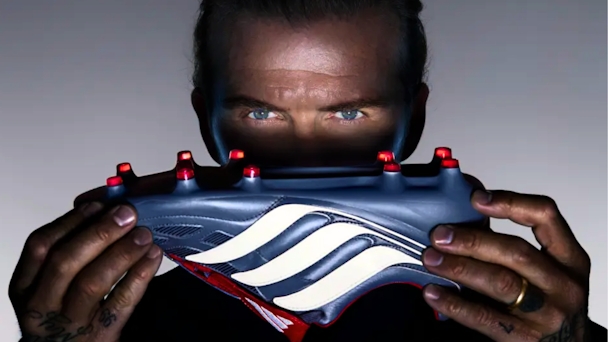If football remains obsessed with nostalgia, can it have a future?
What if the fans have already had their best experiences in football? Is holding onto that enough to secure the future of the sport? Creative strategist Ausura Eccleston explores.

Beckham stars in Adidas Predator ad
In the age of postmodern football, fans are living in the past. The current sentiment of football is bleak, with audiences fed up with the emphasis on stifling tactics, robotic players and even an oversupply of football being served to fans.
Recent international tournaments and social trends have highlighted how much fans are connecting to nostalgia in football more so than the modern interpretation of the game.
Fans are jaded with the current state of football
Across the world, a growing contingent of football fans, particularly young fans, are growing disillusioned with football. Even among those within the sport, this feeling is pervasive.
Brazilian legend Ronaldo claimed that “football is boring” and he’d “rather watch tennis” while Uruguayan manager Marcelo Bielsa echoed this, “when it becomes completely predictable, it loses its appeal.”
This growing predictability is at odds with the jeopardy that any sport needs to feel exciting.
This predictability is exemplified by Manchester City and Pep Guardiola’s dominance in English football, prompting a revolution around the world that has seen an overly pragmatic approach replace the more free-flowing style of the past. The focus on possession and control means that football has slowly become sterile and predictable, a view shared by the greatest player in the world.
It’s not just the playing style that audiences are tired of. Spanish player Rodri hinted that players were on the verge of striking due to the ever-expanding football calendar. Besides legitimate concerns over player welfare, the additional games from the new Champions League and World Cup formats mean that players are exhausted, resulting in sub-par performances. This, in turn, impacts the enjoyment fans get from them.
Additionally, the lack of diversity of winners among the major competitions has an impact. Real Madrid have won six out of the last ten Champions League Competitions.
Manchester City have similarly won six out of the last ten Premier League titles, while France’s Ligue 1 is even more one-dimensional. When fans can most probably tell who is going to win, they’re less invested in the competition.
The Euros made fans nostalgic for entertaining football
For fans who are of this mindset, the 2024 Euros came at the perfect time, reminding fans of more entertaining times.
Conversations around the number of long-range goals scored in the competition, especially during the opening stages was a big talking point. After the first round of games, just under a third of goals were scored from outside the box compared to 13% in 2020, and 16% in 2016. It’s unsurprising that fans would see the phenomena as an antithesis to Guardiola’s principles that breed bland football and generally enjoyed the increased entertainment value.
Football, even if for a moment, was back.
The #BarclaysMen trend highlighted the need for iconic characters
Besides more expressive playing styles, fans are also nostalgic for iconic characters, who don’t necessarily play for the best teams or are worldclass players, but have unique traits and playing styles that set them apart.
Recently the #BarclaysMen trend on social media saw users uploading videos of iconic footballers from the 2000s when the English Premier League was sponsored by Barclays.
Interspersed between the #BarclaysMen content was dialogue reminiscing about a time where football was more exciting, unpredictable, and crucially when the players had distinct personalities.
Whether it was Jay Jay Okocha’s incredible flair or Rory Delap’s freakishly long throw-ins - the unique characters became cult heroes which fans miss from today’s era of football.
Brands tapping into nostalgia in smarter ways will reap rewards
Nowadays, brands are harnessing this strong yearning for nostalgia increasingly through the type of products being released, with Adidas in particular doing well on this front. Its product strategy of re-releasing the iconic Predator football boot has been particularly inspired and well received, with the most recent Jude Bellingham signature Predator getting fans excited. At the Euros, we’ve also seen Adidas release multiple lines of retro football shirts, and certain teams were seen donning retro training tracksuits.
Nike has also been tapping into the nostalgia craze.
It partnered with Ronaldinho to release the Mad Pack line of football boots and is also releasing the similarly iconic Total 90s football boots as well as a retro Brazilian jersey. With the likes of Corteiz and Palace both releasing 90s Brazil-inspired collections, showing that this tactic is being adopted en masse, there’s a chance that it will have diminishing returns as the market gets flooded with retro products of all types.
To cut through, brands need to find new angles beyond just fashion to resonate when it comes to stirring up nostalgia in fans.
In its Air Max 95 collaboration with Nike, Corteiz nodded to the culture and not just the products of the past when they referenced the iconic Ronaldinho crossbar challenge in their promo, recreating it with Phil Foden to create content and experiences that were central to the release strategy.
Key takeaways for brands:
Nostalgia on its own won’t make enough of a dent. As this becomes the default tactic for brands, combining nostalgia with contemporary talent and partnerships will be more effective in reaching broader audiences, while still drawing in younger ones. Umbro’s partnership with Crystal Palace to create a contemporary version of the classic England kit is a great example of this and puts a modern twist on a nostalgic piece in a way that younger audiences can relate to.
There’s a need to go beyond fashion – every football fan loves a retro shirt, but to cut through brands should explore other cultural angles that play on nostalgia. Gaming and music are underexplored categories with massive potential.
Bringing nostalgia to the real world has worked across other categories and it’s no different for Football. The Corteiz x Nike ‘95 shoe collab maximized the nostalgia and brought it to the forefront with a crossbar challenge that had eager fans queuing for hours in an attempt to win the shoes. In a similar vein, Corteiz hosted a Germany shirt exchange pop-up, encouraging fans to bring in their own old Germany jerseys in exchange for an unreleased Corteiz version. The brand is adept at taking online hype and channeling it effectively through drop culture activations, building mass hysteria and wider desire.
Ausura Eccleston is a creative strategist, who specializes in exploring unique insights from sport and culture. He can be reached on LinkedIn for any available strategy roles.
